Best All-Around Climbing Harness
Petzl Sitta
Designed for: Rock, Ice, Alpine | Weight (size large): 10.0 ounces
REASONS TO BUY
Versatile for all styles of climbing
Excellent mobility
Great features
Lightweight
REASONS TO AVOID
Not the most comfortable for hanging
Expensive
If we had to choose only one harness for any style of climbing, the Petzl Sitta is it. It’s incredibly light, packable, and has four excellent gear loops that hold as much gear as you could possibly haul up a climb. The front gear loops have dividers that further improve gear organization, and ice clipper slots make this harness versatile for use in all four seasons. It features a wide padded waistband and leg loops that are plenty comfortable for hanging, standing, climbing, and belaying. This harness is a great option no matter which climbing disciplines you participate in.
Unfortunately, the Sitta isn’t as comfortable as other harnesses for long-hanging sessions. As such, it is less suitable for aid climbing and epic belay sessions at the sport crag. If your main focus is sport climbing, the Black Diamond Solution is probably a better choice for its hanging comfort alone. That said, the Sitta still offers plenty of comfort for most days out. Another notable drawback is the price point. But considering that you can use this harness any day you go climbing, it may eliminate the need for advanced climbers to purchase different harnesses for different activities, making the Sitta a valuable investment.
Read more: Petzl Sitta review
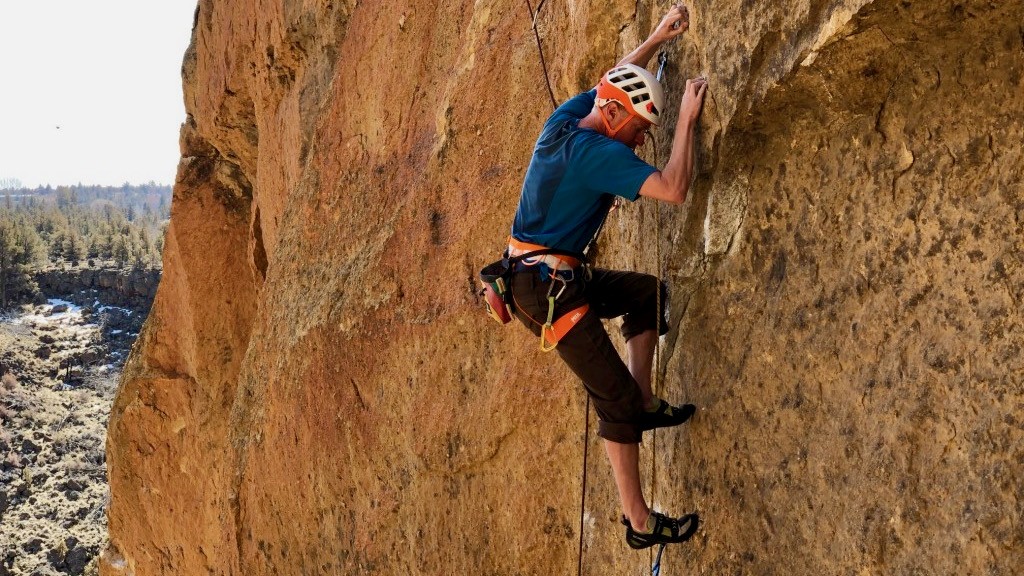
The Petzl Sitta is a high-end, lightweight harness that is ideal for all climbing disciplines.
Credit: Andy Wellman
Best Bang for the Buck
Petzl Sama
Designed for: Sport, Trad | Weight (size large): 14.8 ounces
REASONS TO BUY
Very comfortable, especially for belaying
Good arrangement of gear loops for any style of rock climbing
Affordable
REASONS TO AVOID
Waist belt tends to ride up when hanging
Not the best choice for ice, alpine, mixed, or mountaineering
The Petzl Sama is a great choice for sport or trad climbing. While there are less expensive options out there, the performance they offer is nowhere near that of the super comfortable Sama, and it’s still a bit cheaper than most other alternatives. Whether hanging out at the base of a crag or hanging at belays many pitches off the ground, this is one comfortable harness. We also love how the elastic fixed leg loops allow for greatly increased mobility without any noticeable constrictions of movement. Although it’s designed primarily for sport climbing, it’s also a solid choice for trad climbing, thanks to the wide, rigid front gear loops and large, easy-to-access rear gear loops, which give you plenty of room for storing all of the long route necessities.
Like all our other award-winners, the Sama is not perfect and has a few small flaws. We would really love to see the inclusion of a larger, but still low profile, fifth-gear loop in the back. Due to a lack of ice-clipper slots, this harness isn’t the best pick for alpine and ice climbing. A harness like the finely tuned Blue Ice Choucas Pro is a better alpine harness. But if you prefer plugging cams, clipping bolts, or hanging at the gym, and especially if you want all of the above at an affordable price, the Sama will not disappoint.
Read more: Petzl Sama review
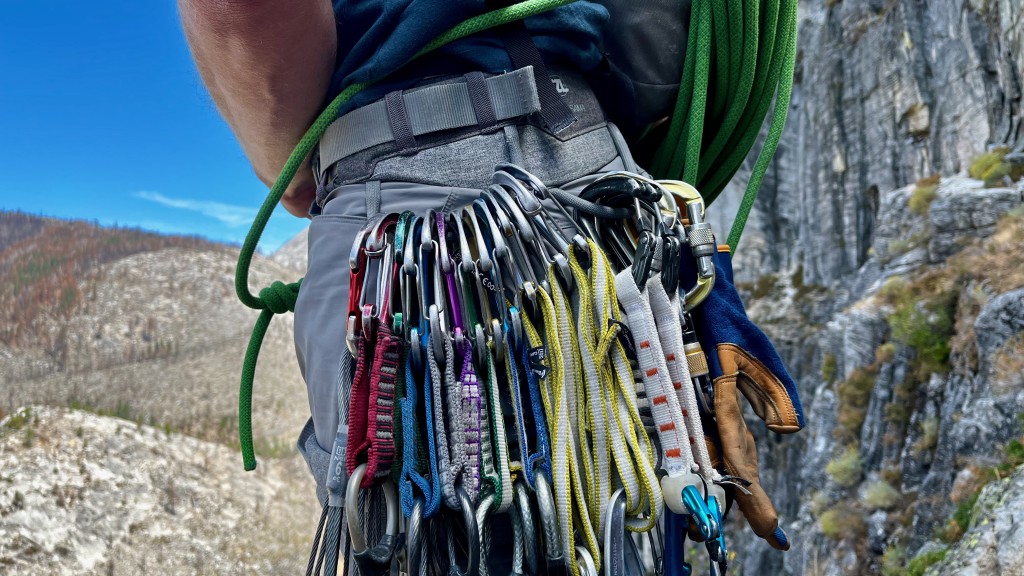
The Sama’s gear loops are large enough to fit a full double rack for long, intriguing trad routes.
Credit: Penney Garrett
Best Lightweight Harness
Blue Ice Choucas Pro
Designed for: Trad, Alpine, Ice | Weight (size large): 5.3 ounces
REASONS TO BUY
Super light and compact
Highly versatile for all different climbing disciplines
Surprisingly comfortable
REASONS TO AVOID
Comparatively expensive
Not as comfortable for hanging belays
The Blue Ice Choucas Pro is a radically lightweight, fully-featured harness built for any style of climbing. This harness can tackle any technical objective with huge gear loops, four ice clipper slots, and plenty of length adjustment in the waist. Weighing in at around half the mass of the competition, this harness sets a new standard in lightweight performance for technical climbing gear. You can barely feel it when moving, meaning it can be used for acrobatic, hard climbing.
The biggest shortcoming of this harness is the lack of padding. Even though the waist belt and leg loops are contoured to better fit the human body, there just isn’t any substitute for foam padding and stiff fabric when it comes to hanging comfort. Climbers who spend a lot of time hanging would be better off choosing a slightly heavier harness, like the Black Diamond airNET, which hangs better than the Choucas Pro, even without the assistance of padding. However, for alpine, ice, and trad climbers who want to shave every ounce without sacrificing utility, the Choucas Pro is a game-changer.
Read more: Blue Ice Choucas Pro review
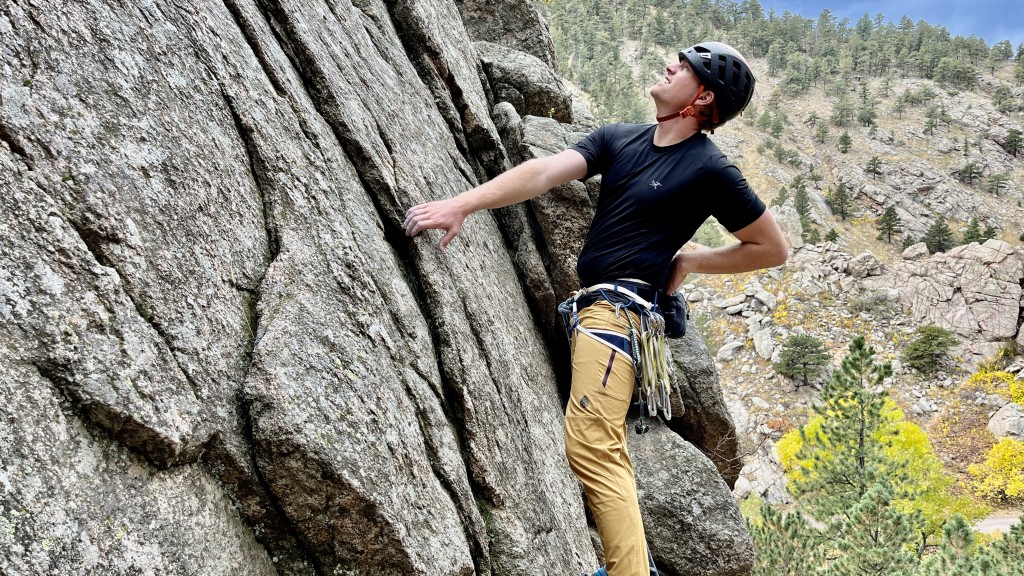
This lightweight harness is comfortable and offers great mobility.
Credit: Jeff Dobronyi
Best Harness for Sport Climbing
Black Diamond Solution
Designed for: Sport, Indoor | Weight (size large): 13.3 ounces
REASONS TO BUY
Excellent comfort for climbing or belaying
Holds enough quickdraws for long routes or multi-pitch sport
Great value
REASONS TO AVOID
Not versatile
On the heavier side for sport climbing
The Black Diamond Solution has everything we want in a sport climbing harness. The leg loops and waist belt are super comfortable, both while climbing, walking around the crag, or belaying your partner on their project. The molded gear loops are easy to clip, and while they won’t hold enough gear for most trad climbing, they hold plenty of quickdraws and associated belay and rappelling gear for multi-pitch sport climbing. The Solution also makes a great gym harness.
Since the Solution is designed strictly for sport climbing, it’s not very versatile. When heading out for trad, alpine, ice, or mixed climbing, we reach for a model like the uber-versatile Petzl Sitta (which is also great for sport climbing!) The Solution’s features make life at the crag easy, but they also add on the ounces, as this is one of the heavier sport-climbing specific harnesses on the market. But if climbing and hanging comfort is the top priority for your sport climbing addiction, this is the best harness you can buy.
Read more: Black Diamond Solution review
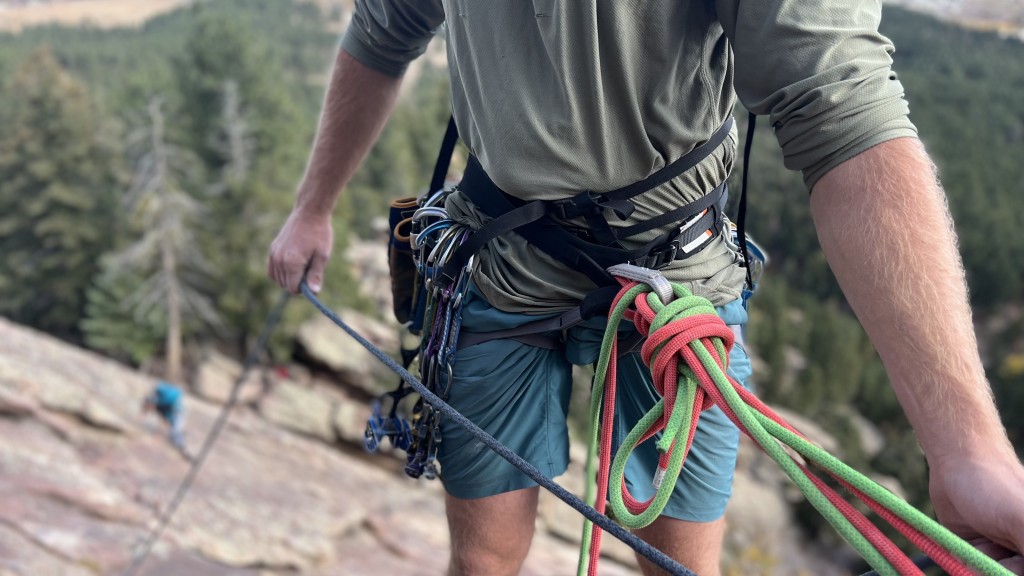
The Black Diamond Solution at work at a hanging belay.
Credit: Eric Messier
Best for Mountaineering and Technical Skiing
Blue Ice Choucas Light
Designed for: Mountaineering, Ski Mountaineering | Weight (size large): 3.3 ounces
REASONS TO BUY
Extremely lightweight
Maximum mobility
Easy to put on without taking off crampons or skis
REASONS TO AVOID
Uncomfortable for hanging
Only good for niche use
Light on gear loops
The Blue Ice Choucas Light is a lightweight specialty harness that excels for use while skiing technical terrain, traveling on glaciers, or climbing easy mountaineering routes. Its low weight and small packed size help this harness disappear into a pack when not needed. When it’s time to put the harness on, you can do so without taking off skis or crampons, and the thin waist belt and leg loops make the harness unnoticeable when walking, skinning, or climbing.
This harness isn’t very comfortable to hang in, but it won’t bother you to do a couple of rappels or hang at a stance for a little while. For routes with minimal hang time and where the chance of falling is negligible, this harness is a lightweight dream. However, for routes with any extended hanging, you’ll wish you had a more comfortable harness. The tiny gear loops can hold enough gear for easy mountaineering routes, but not much more than a light rack and belay kit. This minimalist design prevents this harness from being as versatile as the Choucas Pro for most climbing applications. But for users who want a niche harness for their lightweight ski mountaineering missions, this is the best option.
Read more: Blue Ice Choucas Light review
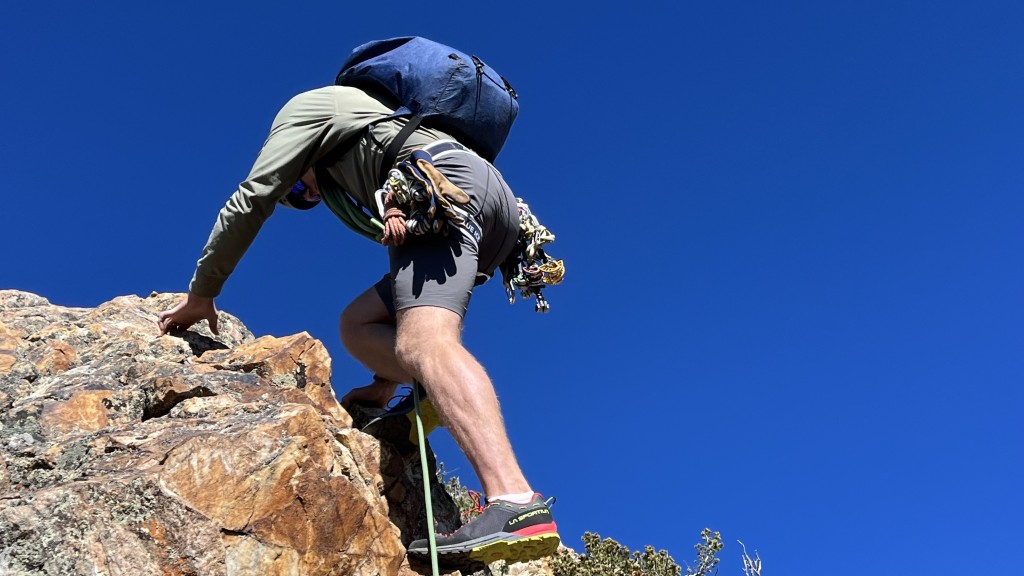
Scrambling over low 5th-class rock in the Choucas Light.
Credit: Jeff Dobronyi
Compare Products
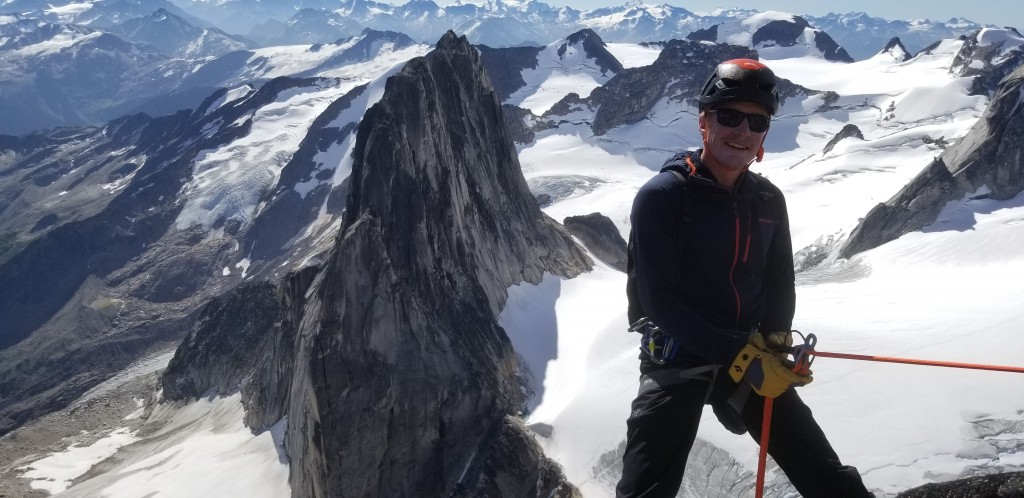
Rappelling off the top of Bugaboo Spire, with Snowpatch Spire in the background, wearing the Petzl Sama, a versatile and super comfortable all-around harness.
How We Test Climbing Harnesses
We’ve reviewed climbing harnesses for the last 12 years and tested over 45 models. We stay current with the changes in the climbing world and consistently add new products to this review as they become available. We buy every product (no freebies) and test them head-to-head in several scientific and subjective assessments to see how they compare. We take them sport, trad, gym, and alpine climbing. We pay particular attention to the comfort level when climbing, belaying, and just standing around. We test all their features and determine their versatility. We also carefully weigh each model and note how many pieces of gear each gear loop can handle. Furthermore, we gather information from a wide variety of testers to make sure our judgments are accurate. For even more details on our testing process, see our How We Test article.
We use five metrics in our scores and assign the following percentage weightings to each metric:
- Hanging Comfort (30% of overall score)
- Standing Comfort and Mobility (25% of overall score)
- Features (20% of overall score)
- Versatility (15% of overall score)
- Adjustability (10% of overall score)
Why Trust GearLab
Heading up our testing is IFMGA Mountain Guide and review editor Jeff Dobronyi, who climbs and guides all over the world, both on long vertical rock climbs and committing alpine climbs. He has guided climbers on peaks from the Alaska Range to the Tetons, San Juans, Alps, and Andes. From his home base in Colorado to the walls of the Dolomites, Jeff puts these harnesses through the wringer and has a discerning eye for which harnesses get the job done and which come up short.
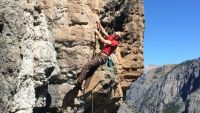
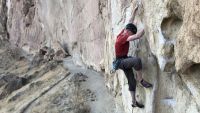
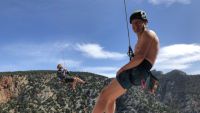
Analysis and Test Results
To provide our overall ratings and to best understand the relative performances of each harness, we tested and assessed each one based on five different metrics: hanging comfort, standing comfort and mobility, features, versatility, and weight and packability. Each harness was compared to the others, and since this is the finest collection of harnesses we could assemble, just because a product received a low score doesn’t mean it’s a bad product. It’s also likely that you have slightly different priorities than us when selecting a harness, so be sure to assess what type of climbing you will most likely use it for and give those pertinent considerations greater value.
Value
Harnesses come at a wide range of price points, and many of our top choices and recommendations are not the most expensive. While high-priced harnesses usually have perks and features that may be lacking in others, the reality is that you can get a great harness for much less than the most expensive choices.
Particularly good value can be found with the Petzl Sama, which performs nearly as well as the best harnesses on the market for a fraction of the price. This harness excels at every rock climbing discipline, and our testers would have no problem using this harness for the rest of our lives on the rock (replacing it periodically, of course! No harness is meant to last forever). The Black Diamond Solution is also a great value, considering its top performance for sport climbing. If all you do is gym climb indoors and sport climb outdoors, this is an inexpensive option that will satisfy your every desire. If you need a four-season harness that can also perform on ice and mixed climbs, the Edelrid Moe isn’t a bad choice.
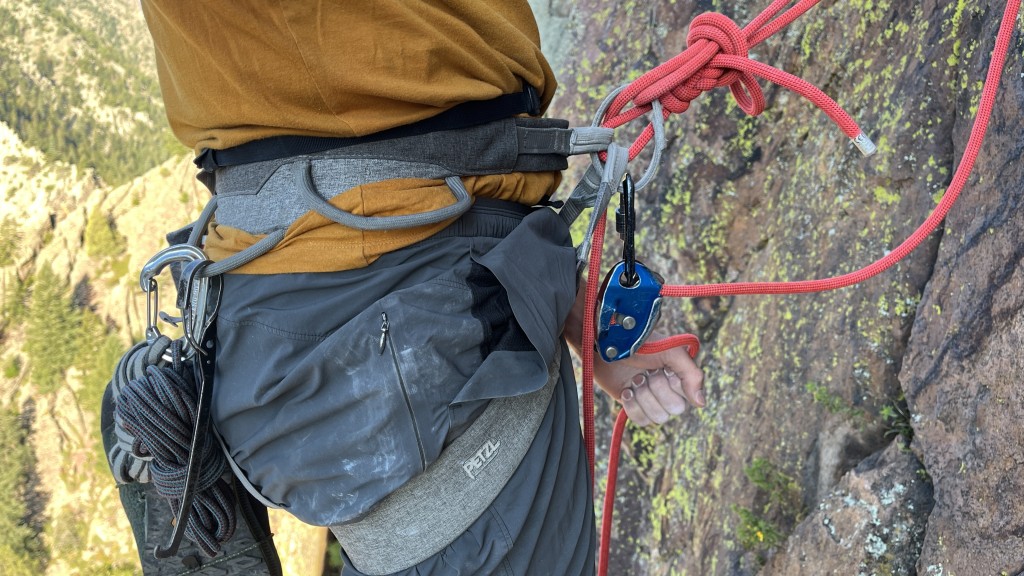
The Sama is comfortable for long hanging sessions while belaying sport climbs or hanging at belays all day on multi-pitch routes.
Credit: Jeff Dobronyi
Hanging Comfort
We’re going to let you in on a simple truth when it comes to hanging in a climbing harness: it is not comfortable, at least not for very long. While this truth may not register in your consciousness as you work your way up a steep sport climb, anyone who has spent an hour or so at a hanging belay waiting for their partner to finish their lead can attest to the significant discomfort of hanging in a harness for a long period. Climbing harnesses have fabric that wraps around the waist, lower back, and back of the thighs, which is necessary for safety. But the fact remains that these parts of your body are not designed to directly hold weight for long periods, and the pressure put on them becomes uncomfortable or even painful rather quickly. While each harness uses a different strategy to diffuse or pad against the load, none of them come close to the sensation of sitting in a chair or on the couch. Perhaps this metric should be better thought of as least hanging discomfort rather than hanging comfort.
To conclusively say which harnesses are the least uncomfortable while hanging in them, we went to the bottom of a local cliff and spent 10 minutes successively hanging in each harness, one after the other, in a position that mimics a hanging belay (and also how you would hang at the end of the rope or while rappelling). In this position, a person’s weight is distributed evenly between the waist belt and the leg loops. About half of the weight rests on the person’s upper legs and hamstrings, while the lower back takes the other half.

Hanging in a harness is usually not all that comfortable. We hung in each model for lengthy periods of time to test how they felt, and there is no doubt the BD Solution is among the most comfortable.
Credit: Andy Wellman
Black Diamond’s “Fusion Comfort Construction” employed on the Solution and airNET offers the most comfortable hanging experience. A large part of this is due to the wide leg loops that diffuse the load in the same way the waist belt does. This harness comes closest to making us forget that we are hanging off the side of a cliff or hanging on a belay device while our partners work out the moves on their project.
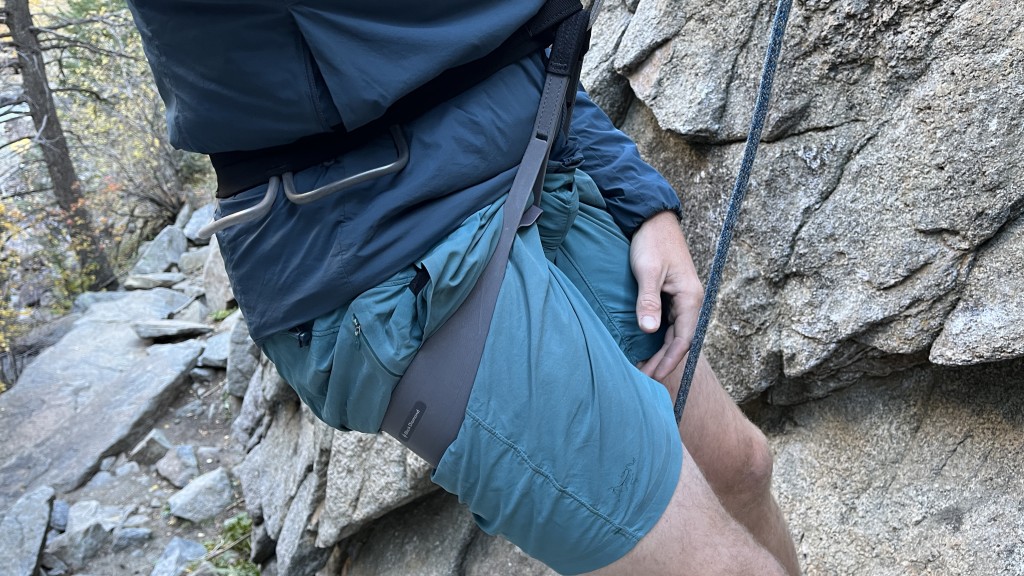
Hanging at the crag to test the comfort of the Black Diamond Solution.
Credit: Jeff Dobronyi
Designs that are thinner or diffuse the load with a single strap of webbing, especially in the leg loops, tend to cut off circulation and are noticeably less comfortable immediately. The soft frame construction of the Edelrid Sendero combines a load-bearing strap internal to the hip belt with a wide, well-padded back to evenly distribute weight across your back. Similarly, the wide, well-padded leg loops on the Petzl Sama, Adjama, and Aquila also offer excellent hanging comfort relative to the competition.

The Petzl Aquila is comfortable to wear at hanging belays, like this one perched well off the deck.
Credit: Jonathan Cooper
Standing Comfort and Mobility
If you are wearing a harness but aren’t hanging at a belay or rappelling off a cliff, then chances are you are moving around, climbing, walking, or merely standing at the base of the crag or gym. This metric is designed to assess how comfortable a harness is during all of these non-hanging moments, which turns out to be the majority of the time while you wear a harness.
The “lingerie” feeling of the Blue Ice Choucas Pro makes it the most comfortable harness to wear while standing, belaying, or climbing. The waist belt and leg loops are made from a thin, pliable mesh that doesn’t resist bending or flexing, allowing it to easily move with you.
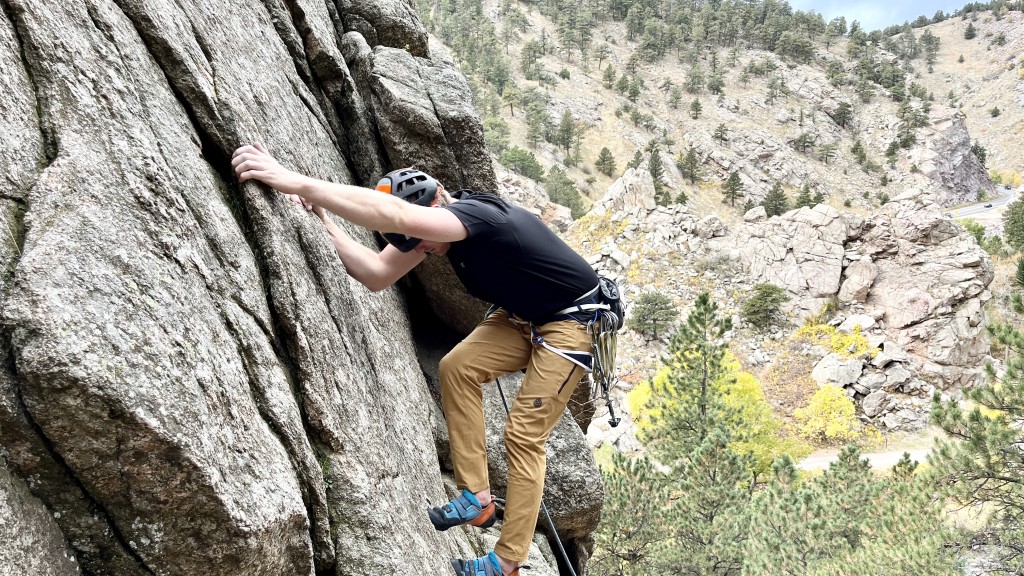
Granite slab climbing in the highly mobile Blue Ice Choucas Pro.
Credit: Sam Willits
The super lightweight and “barely there” Black Diamond airNET is super comfortable while standing around, mostly because you can barely tell you’re wearing it. It’s also really comfortable for walking in since the Infinity Loop belay ring – also featured on the Black Diamond Zone – doesn’t catch as you move your legs, and the gear loops are so minimal they sit really easily under a pack.
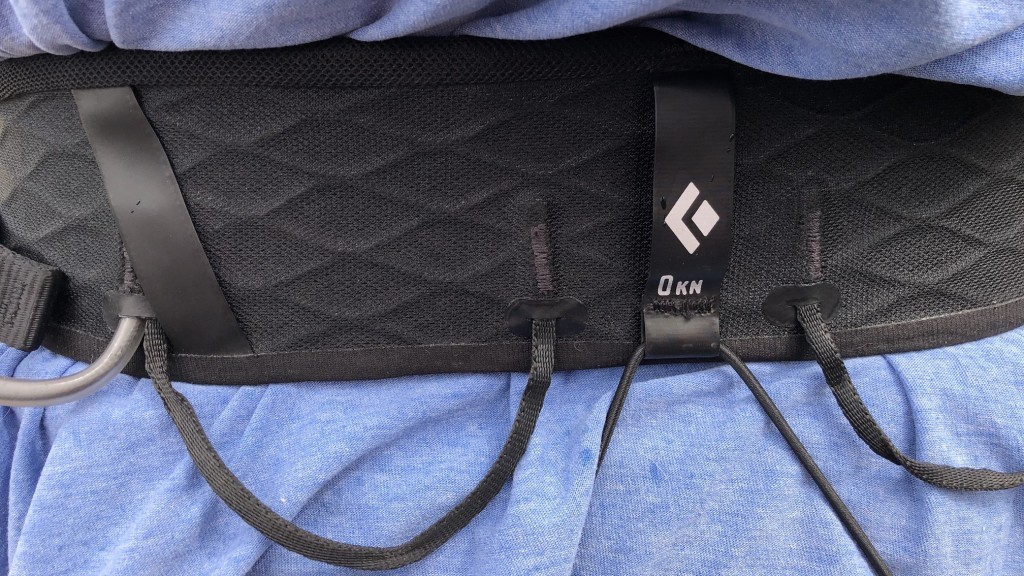
You can see the cross-hatched pattern of the airNET on the inside of the waist belt. Not only does this create sort of a cool visual effect, but does a great job spreading out loads with very little material weight. This might be the most comfortable waist belt you can buy.
Credit: Andy Wellman
A far more versatile option is the Petzl Sitta, which is also very comfortable to wear. Its stretchy leg loops expand if you are wearing thick clothes, and the fluidity that we maintain while walking in this harness makes it an excellent choice for mountaineering. The Black Diamond Solution is also one of the most comfortable harnesses to climb in. Its waist and leg loops are very minimally padded so that there is no bulkiness to impede movement or provide a distraction. Its wide waist belt sits comfortably under the hip belt of our climbing pack, and it holds a rack of quickdraws without sagging or putting pressure on the hips. All of our favorite harnesses are comfortable to stand or climb in.

Whether sport climbing, as shown here in Chulilla, Spain, or walking on glaciers or climbing alpine rock, the Sitta harness is the most mobile and comfortable for walking and hanging out in.
Of all the harnesses in our review, the minimalist mountaineering-specific harnesses are by far the most comfortable for movement. These harnesses are almost in a class by themselves for mobility. Without padding or stiff loops, the Black Diamond Couloir UL and Petzl Fly, as well as our favorite, the Blue Ice Choucas Light, all allow for a complete range of motion without noticing that you’re even wearing a harness.
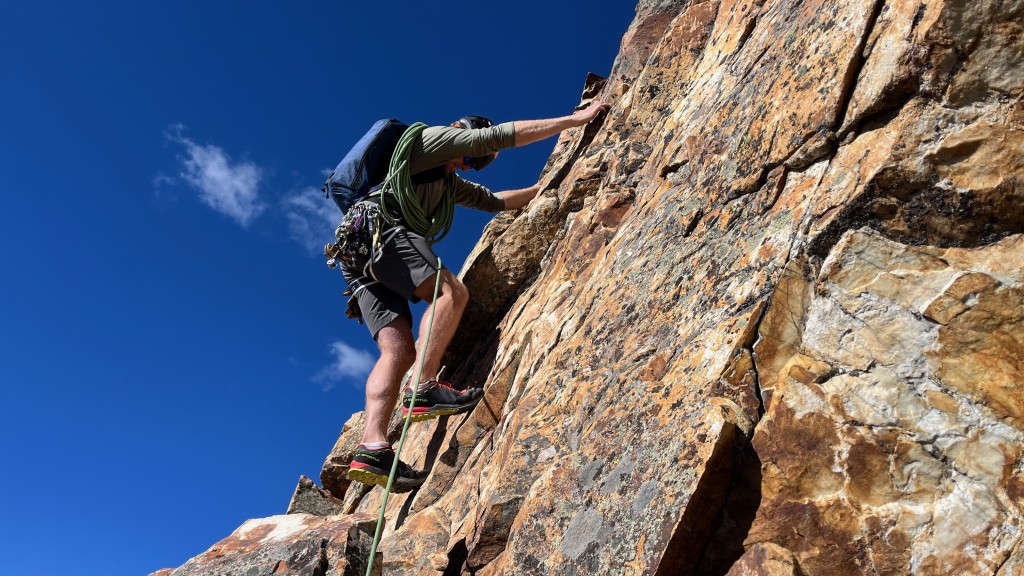
The Blue Ice Choucas Light is barely noticeable when climbing easy terrain and while mountaineering.
Credit: Jeff Dobronyi
Features
Features play a large role in dictating what sort of climbing a harness is best suited for. Adjustable leg loops, ice clipper slots, and many large gear loops allow one to carry a lot of protection, including ice screws or even ice tools. On the other hand, small gear loops that rest close to the body, combined with fixed elastic leg loops, allow one to cut down on weight and bulk and keep a harness streamlined and simple — ideal for sport and gym climbing.
The Petzl Sitta has an ideal feature set for almost any type of climbing, which is why we call it the best all-around option. Four rigid, easy-to-clip gear loops and super low-profile ice clipper slots are some of the things that all work really well. It even has a divider in the front gear loops that helps you stay organized, separating cams from slings and keeping critical gear near the front of the harness where it is easily accessible. The Petzl Adjama also has a great set of gear loops.
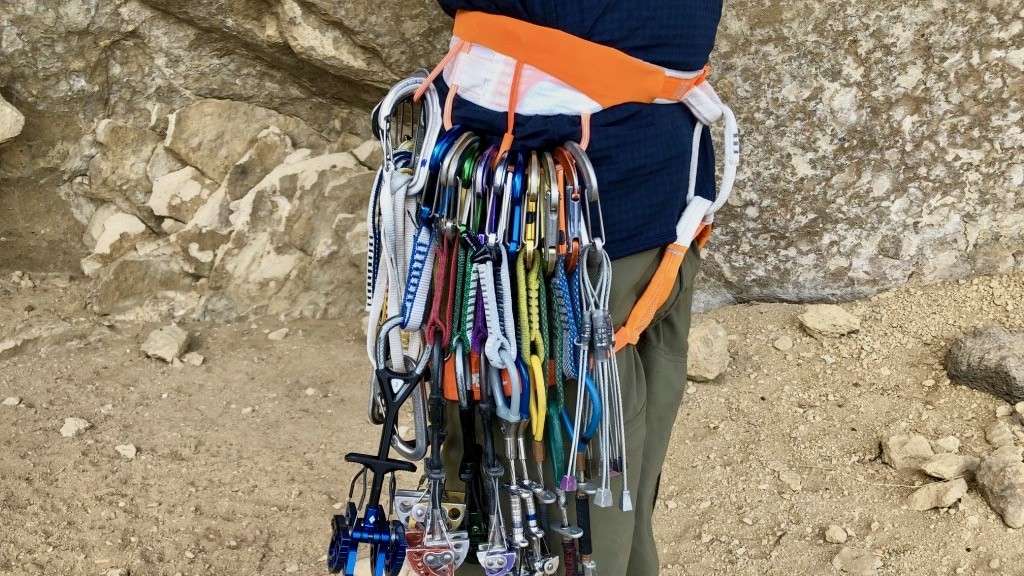
The Sitta has plenty of space for a full rack of gear. The front gear loop has a unique spacer to divide gear and help you stay organized.
Credit: Andy Wellman
The Petzl Aquila features some of the best gear loops on the market, with two huge gear loops on each side and one extra-large loop that spans the back of the harness. We especially like this harness for trad and multi-pitch climbing since we can fit a full double-rack with tons of cams, nuts, and slings on the front two gear loops. On the rear side gear loop, we hang our belay and anchor equipment, which often has plenty of space to accommodate extra pieces of protection. This oversized back gear loop is also perfect for hanging approach shoes, a first-aid kit, a water bottle, an extra layer, and climbing gloves.
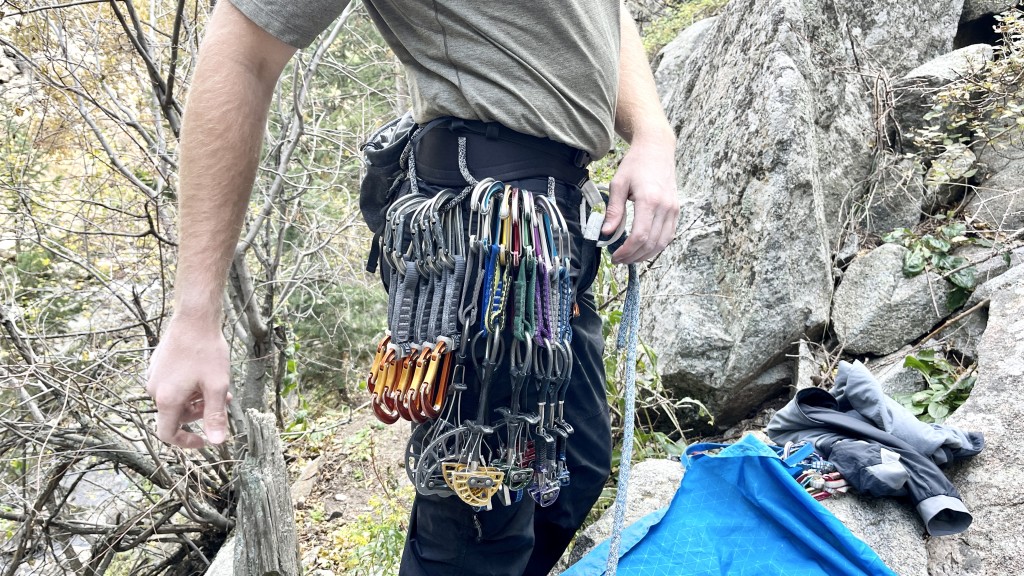
Racking up in the Petzl Aquila for a long mixed-protection climb.
Credit: Jeff Dobronyi
Versatility
All of these harnesses are designed to be used for climbing, but the truth is that there are many different forms of roped climbing: sport, gym, trad, ice, alpine rock, alpine mixed, and mountaineering. It is possible to buy a harness specifically designed for and tailored to each of these purposes, and indeed, some of the harnesses here only fit a narrow range of uses.
The most versatile harness by far is the Petzl Sitta. It’s an ideal choice for any climbing discipline — sport, trad, ice, or alpine. In particular, its combination of very low weight and bulk makes it super packable for adventure climbs, but we also love how minimal yet comfortable it feels while clipping bolts.
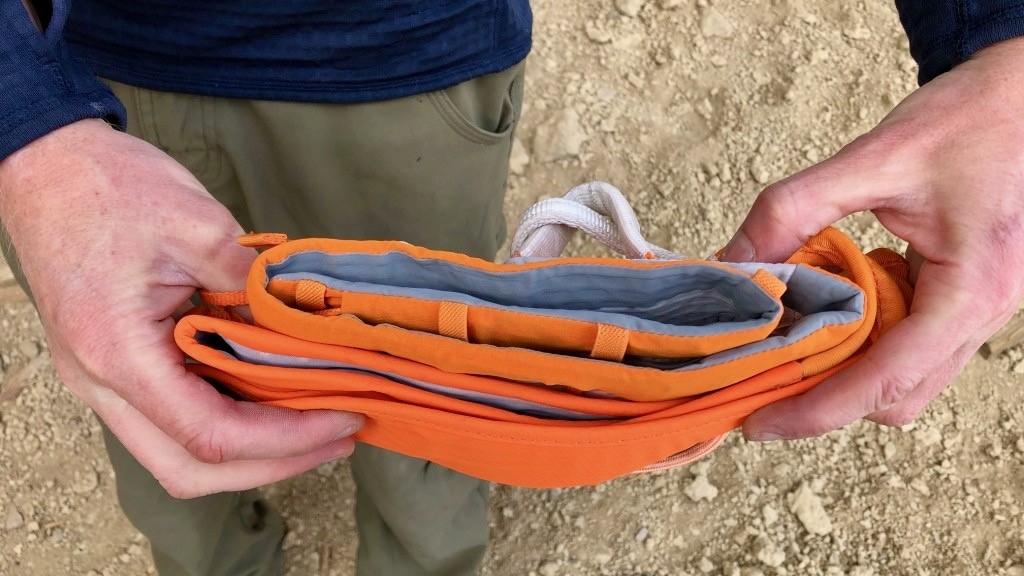
The Sitta’s light weight and small packable size makes it easy to carry with you in a pack on a long approach or in the mountains, greatly increasing its versatility for multiple disciplines.
Credit: Andy Wellman
Another versatile option is the Blue Ice Choucas Pro. This harness doesn’t have any padding, making it a poor choice for climbs involving lots of hanging belays or long rappels, but for alpine climbs, ice climbs, and any rock climbs that don’t involve hanging, this harness is an easy choice for its performance.
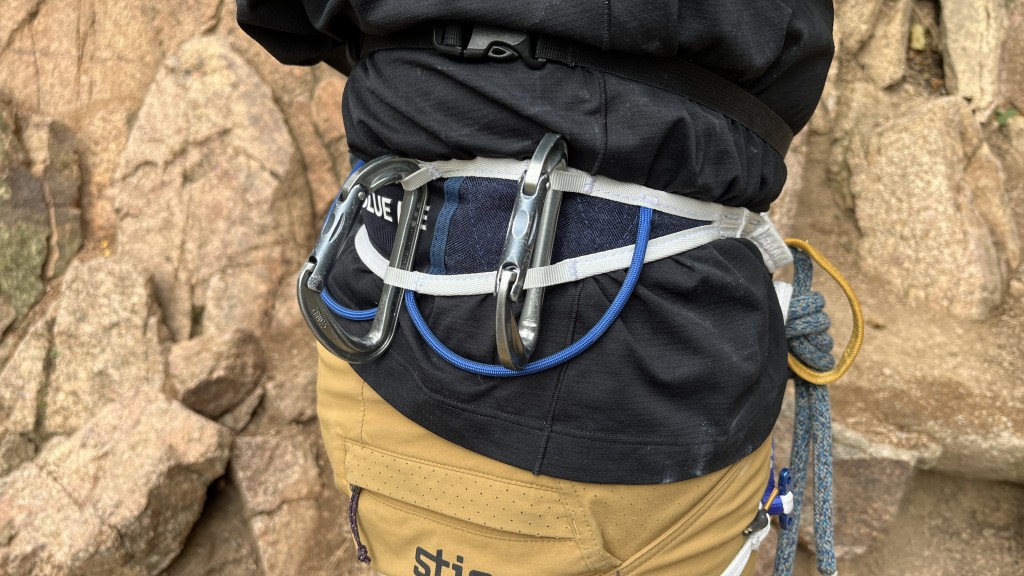
The Choucas Pro has four ice clipper slots (two on each side) and is a great choice for ice and mixed climbing.
Credit: Jeff Dobronyi
Most other harnesses aren’t as versatile as these choices. Many harnesses eliminate ice clipper slots and adjustable leg loops needed for ice climbing in order to shave weight for rock climbing. The Petzl Aquila is a bit of an exception to this rule. It has great gear loops that are large enough to hold a big rack while trad or multi-pitch climbing, and the harness is also svelte enough for sport or gym climbing.
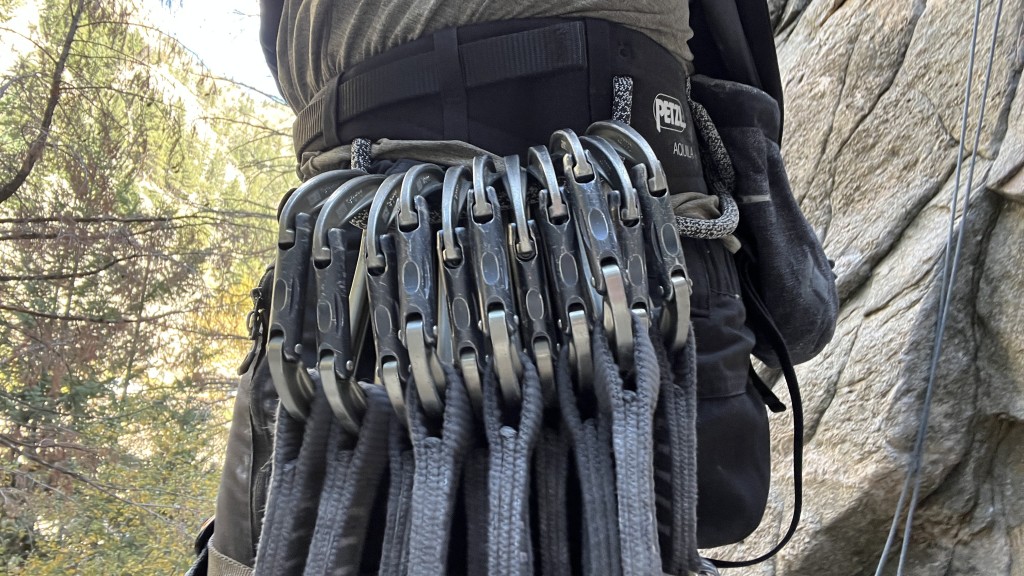
The Petzl Aquila is built for long trad and multi-pitch climbs, but it’s also versatile for long sport routes, thanks to it’s large gear loops.
Credit: Jeff Dobronyi
Adjustability
Most of the harnesses in our selection offer an adequate amount of adjustability. We all need a waist belt that can accommodate the thickness of different layers that we tuck into the harness – a tee-shirt on hot summer days versus a puffy jacket for chilly fall or winter climbing. Adjustability also allows us to share our harness if we take friends climbing or to help introduce new climbers to the sport.
The Petzl Aquila offers the most adjustability in the review. With 11 inches (28 centimeters) of waist length and 6 inches (15 centimeters) of leg circumference adjustment, this harness can fit a variety of body types. It also allows the same user to wear any combination of clothing choices while still comfortably fitting into their harness.
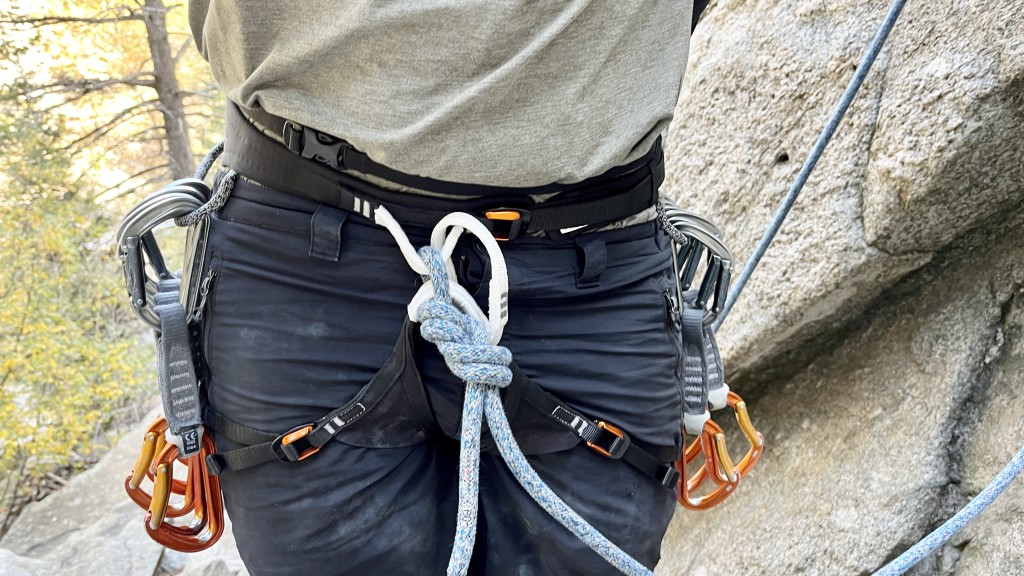
The Petzl Aquila has highly-adjustable waist and leg loops.
Credit: Jeff Dobronyi
Another highly adjustable harness is the Black Diamond Technician. This four-season harness has plenty of length adjustment in the waist and leg loops, making it a great option for four-season climbers. Large gear loops and ice clipper slots add to its versatility for all climbing activities.
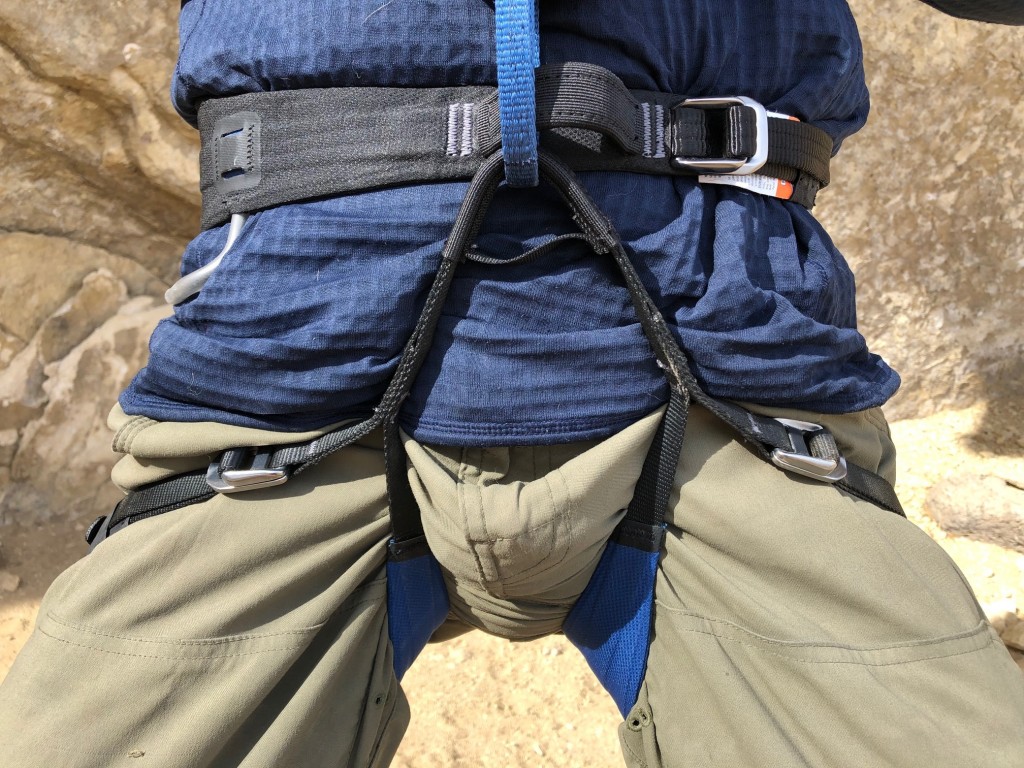
With a wide range of adjustability in both the waist belt and leg loops, the Black Diamond Technician is suitable for a wide range of users.
Unfortunately, the ultra-lightweight mountaineering harnesses offer very little adjustability. These harnesses don’t use traditional waist belts. Instead, they employ fixed-length waist belts with small cinch straps in the front. These harnesses offer around half of the length adjustment in the waists as traditional climbing harnesses, and generally, the lightest mountaineering harnesses don’t offer any adjustability in the leg loops. For users interested in these harnesses, be sure to carefully measure for the correct size before you order.
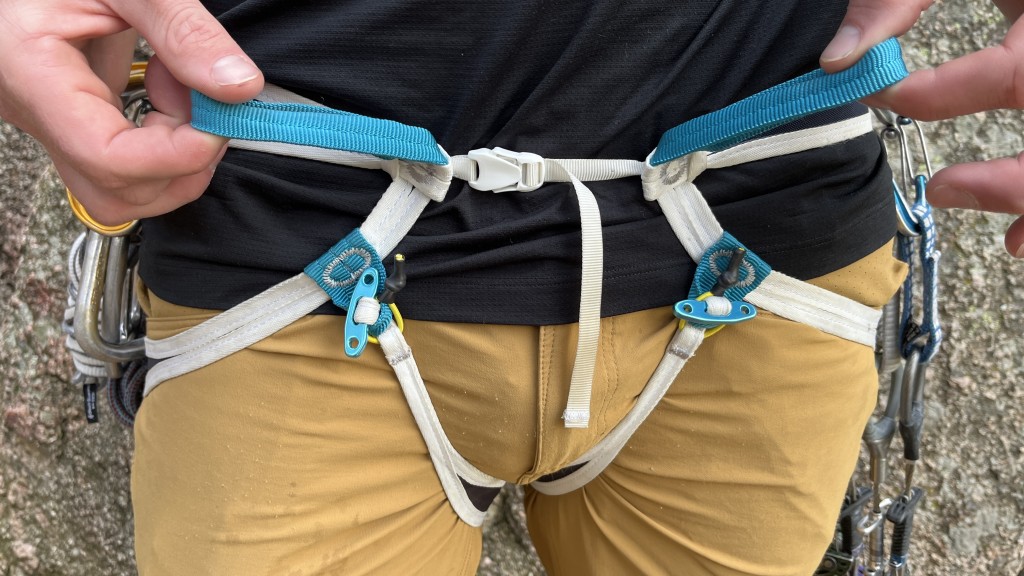
The minimally-adjustable waist strap on the Choucas Light.
Credit: Jeff Dobronyi
Conclusion
We’ve done our best to offer you solid recommendations for the best harness for the money, the best all-around harness, one for sport climbing, multi-pitch climbing, or the lightest harness. However, remember that the best harness for you will be the one that matches your needs and is the most comfortable (or least uncomfortable!) on your body. We hope the information provided here has been useful in your search, and we wish you happy climbing.

Questing through cracks and dikes in the Petzl Sama.
Credit: Jeff Dobronyi

